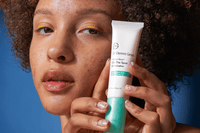How Your Period Impacts Your Skin & Period Skincare Tips
7 min

Very few are immune to at least the occasional PMS pimple. But actually, fluctuating levels of hormones – namely, estrogen, progesterone, and testosterone – throughout your 28-day menstrual cycle mean that your skin is continually undergoing changes (both good and otherwise). One of the great unsolved dermatologic mysteries is exactly how these hormones directly affect skin.
But scientists know with 100 percent certainty that estrogen, progesterone, and testosterone are the main culprits behind hormonal acne in women. As a result, by tracking your cycle and tweaking your skin care regimen accordingly, you can outwit any hormonal curveball Mother Nature throws your way.
Week 1 (Begin counting on the first day of your period)
What’s going on in your body: Amounts of all three hormones drop to their lowest levels during these 28 days.
What this means for your skin: As a result, oil production slows down, meaning skin is often drier than usual. It may also appear dull and lackluster. Plus, since progesterone (the hormone responsible for inflammation) has dipped, you may also experience skin sensitivity and tenderness.
How to adapt your routine: Even if acne is an issue for you, your skin needs moisture right now. That could be in the form of a hyaluronic acid serum (such as Dr. Dennis Gross Hyaluronic Marine Hydration Booster), a thicker face cream (like Dr. Dennis Gross B3 Adaptive SuperFoods Stress Repair Face Cream), or an oil-free moisturizer (Dr. Dennis Gross Hyaluronic Marine Oil-Free Moisture Cushion is a good one), if you’re worried about breakouts.
Also, regular exfoliation will help combat the dullness by getting rid of dead surface cells. Since your complexion might be a bit sensitive during this time, try a gentle chemical exfoliator, such as lactic acid – an AHA that’s also proven to stimulate the production of skin barrier-strengthening ceramides. (Find it in Dr. Dennis Gross Alpha Beta Ultra Gentle Daily Peel)
Week 2
What’s going on in your body: Estrogen levels begin to ramp back up, which stimulates the production of all-important collagen, elastin, and hyaluronic acid.
What this means for your skin: Looking good! Your skin will begin to feel plumper, more refreshed, and not as tight or dry.
How to adapt your routine: While everything’s great on the outside, you should be proactive after your period ends by doing a chemical peel containing alpha and beta hydroxy acids (like Dr. Dennis Gross Alpha Beta Universal Daily Peel). This will clear out pore linings and also encourage cellular turnover – setting you up for success later in your cycle when your complexion outlook isn’t so rosy.
Week 3
What’s going on in your body: Ovulation starts, and estrogen levels reach their apex.
What this means for your skin: This is the week when skin is generally at its absolute best. If you have a first date or an important job interview, schedule it during these seven days.
How to adapt your routine: This is no time to rest on your laurels. Pretty soon (as in, the following week), you’re going to be dealing with a lot more oil. So go on the offensive now by clearing out the oil that’s currently settled in your pores. Clay masks (like Dr. Dennis Gross DRx Blemish Solutions Clarifying Mask) are an excellent way to get rid of excess sebum. And switching to a salicylic acid-based cleanser (such as Dr. Dennis Gross Alpha Beta Pore Perfecting Cleansing Gel) will also help keep pores free of oil. In addition, consistent LED treatments using red and blue LEDs will both help reduce impending inflammation (red LEDs) and kill acne-causing bacteria (the blue LEDs). Both types of LEDs are in the Dr. Dennis Gross DRx SpectraLite FaceWare Pro. Doing those three things, plus maintaining your regular chemical exfoliation via your daily peel, will set you up for success as you end into the last week of your cycle – the time when breakouts are most likely to flare and turn ugly.
Week 4
What’s going on in your body: You now have levels of estrogen and progesterone that are lower than the amount of testosterone in your body.
What this means for your skin: Oil production skyrockets – and gets weird. It’s thicker than usual (more like honey than water), which means oil doesn’t flow easily to the skin’s surface. Instead, it’s more likely to get stuck to dead cells also in the pore and cause a clog. Plus, thanks to all this extra oil, your complexion may appear shiny, pores can look larger, and inflammation is also a possibility.
How to adapt your routine: Continue with your daily peels, clay masks, salicylic acid cleansing, and LED sessions, but add another acne-preventing topical ingredient: monk’s pepper. Dermatologists are loving this medicinal berry because it blocks hormones from connecting with oil glands, which keeps oil production from running amok. (Find it in Dr. Dennis Gross DRx Blemish Solutions Acne Eliminating Gel)
Discover Dr. Dennis Gross Skincare for All Your Skincare Needs
For more skincare tips from the experts at Dr. Dennis Gross, check out our blog’s newest content today. Shop the collection of Dr. Dennis Gross bestselling skincare backed by dermatologists.
Written By
Courtney Brooks
Courtney Brooks has been working alongside Dr. Dennis Gross for close to ten years. She ascribes to his philosophy of customizing in office procedures and at home skincare for specific individual needs. With extensive education in cosmetic dermatology, Courtney prides herself in being able to provide the utmost care, knowledge and results to all patients.
Read More from Courtney Brooks
Written By
Courtney Brooks
Courtney Brooks has been working alongside Dr. Dennis Gross for close to ten years. She ascribes to his philosophy of customizing in office procedures and at home skincare for specific individual needs. With extensive education in cosmetic dermatology, Courtney prides herself in being able to provide the utmost care, knowledge and results to all patients.
Read More from Courtney BrooksRelated Articles
-

author-kayla-kernel, period, skin-and-deeper, unfiltered August 28, 2023 — 8 minutes
The Ultimate Guide to Syncing Your Skincare to Your Cycle
by Kayla Kernel
-

acne, author-ben-gentzler, skin-and-deeper April 03, 2024 — 6 minutes
Hit It: Introducing The Dr. Dennis Gross Alpha Beta On The Spot Eliminator
by Ben Gentzler
-

author-ben-gentzler, myth-busting, oily-skin, skin-and-deeper April 01, 2024 — 9 minutes
Myth busted: Yes, your oily skin does need a moisturizer
by Ben Gentzler
Keep Reading
Stay up to date on the latest advice from our team of skincare experts.
Sign up to receive a monthly digest of skincare, wellness, and lifestyle tips.






